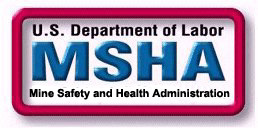
|
MSHA's Occupational Illness and Injury Prevention Program Health Topic "Working With Mercury" |  |
|---|
Mercury is a silvery-white metal element that is liquid at ordinary room temperature; it has no taste or smell. It occurs as metallic mercury (Hg), as cinnabar (HgS) and in perhaps 25 other in organic mineral compounds.
The elemental form (Hg) vaporizes at any temperature down to almost 40° below zero. The vapor also has no taste or smell. The specific gravity of mercury is 13.546; therefore, it is heavier than lead and, like lead and other "heavy" metals, it is a potent poison.
Exposure to metallic mercury or mercury compounds, even in small quantities over a period of time, can cause severe poisoning. Mercury can enter the body by inhalation of vapors or mercury-containing dust, by swallowing (ingestion) or by absorption through the skin. Symptoms of chronic mercury poisoning are weakness, fatigue, inflammation and ulcers in the mouth, bleeding gums, loosened teeth, excessive salivation (spittle), tremors (shaking) and emotional instability. Acute poisoning causes nausea, abdominal pain, vomiting, headaches, diarrhea and, (occasionally) cardiac weakness.
Miners who are exposed to mercury should take rigorous precautions to prevent poisoning themselves and their families. Work clothes should be vacuumed before removal. Vacuum cleaners used for this purpose must be equipped with mercury-vapor absorbing filters. Every miner should shower thoroughly (with special attention to the head and hands), and change into clean clothing before leaving the job site. Soiled clothing should be stored in vaporproof containers and must be laundered after each use. Contaminated clothing should not be shaken or air hosed. Work and street clothing should not be stored in the same locker. Food should not be stored, dispensed or eaten in any place that might be contaminated with mercury.
Smoking should be avoided completely in mercury work areas. The hands and face should be thoroughly washed with warm soapy water and rinsed before the miner eats or drinks. Mercury impervious floors and work surfaces and equipment in mercury work areas must be maintained free of cracks and crevices which might retain mercury. Mercury spillage must be cleaned up promptly either mechanically or chemically. Blowing or dry sweeping cannot be permitted. Mercury contamination is very difficult to control; extreme precautions against spills are needed. Waste mercury or mercury contaminated material must be stored in special chemical solutions or in vaporproof containers. Mercury containers should be labeled and kept securely closed. Remember, you can't taste or smell mercury; precaution against contamination is the best defense.
If you have any questions about this or any other occupational health matter, feel free to ask us. Our job is protecting your health.Contact:
Mine Safety and Health Administration
Metal and Nonmetal Health Division
1100 Wilson Boulevard
Arlington, Virginia 22209-3939
Phone: (202) 693-9630